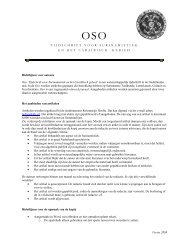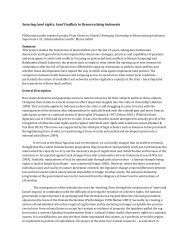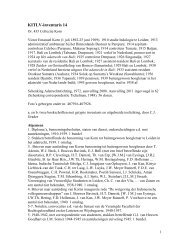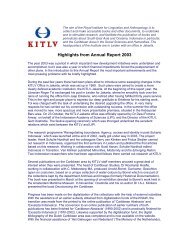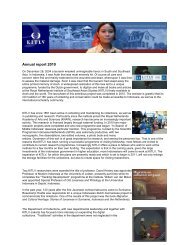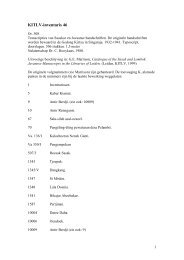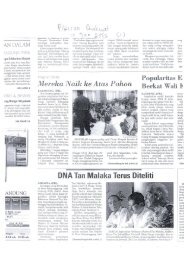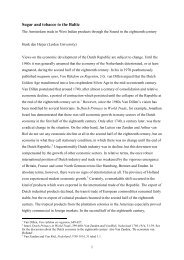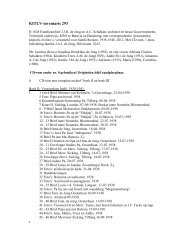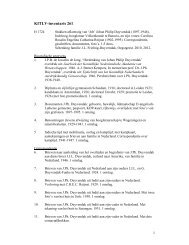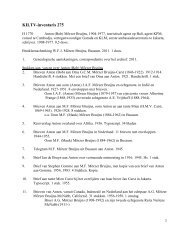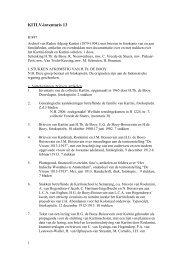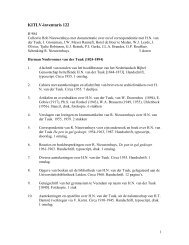The Acehnese past and its present state of study R. Michael ... - kitlv
The Acehnese past and its present state of study R. Michael ... - kitlv
The Acehnese past and its present state of study R. Michael ... - kitlv
Create successful ePaper yourself
Turn your PDF publications into a flip-book with our unique Google optimized e-Paper software.
<strong>The</strong> <strong>Acehnese</strong> <strong>past</strong> <strong>and</strong> <strong>its</strong> <strong>present</strong> <strong>state</strong> <strong>of</strong> <strong>study</strong> 19<br />
<strong>The</strong> end <strong>of</strong> the confl ict <strong>and</strong> subsequent efforts to maintain peace have<br />
received considerable attention elsewhere, as have the immense projects<br />
<strong>of</strong> post-disaster physical <strong>and</strong> social reconstruction. 32 What is important to<br />
note here is that the complex interactions <strong>of</strong> peace-making <strong>and</strong> post-disaster<br />
reconstruction have resulted in major social transformations that are shaping<br />
the next chapters <strong>of</strong> Aceh’s history. <strong>The</strong> stories <strong>of</strong> these developments are<br />
<strong>of</strong>ten dramatic narratives <strong>of</strong> the experience <strong>of</strong> a society beset by multiple <strong>and</strong><br />
massive trauma. Some organizations have already been actively collecting<br />
extensive data on the experiences <strong>of</strong> the confl ict, as well as on the earthquake<br />
<strong>and</strong> tsunami, <strong>and</strong> a growing body <strong>of</strong> work is thus available to scholars<br />
pursuing in-depth investigations <strong>of</strong> the issues <strong>of</strong> trauma, resilience <strong>and</strong><br />
cultural transformation, in addition to the processes <strong>of</strong> physical, political <strong>and</strong><br />
economic restructuring (Damanhuri bin Abbas et al. n.y.). 33<br />
In their attempts to shape new futures for themselves, <strong>Acehnese</strong> are deeply<br />
engaged with interpreting the <strong>past</strong> (Mohammad Said 1961; Zainuddin 1961;<br />
Hasjmy 1983). Some <strong>of</strong> these are linked to particular projects for defi ning<br />
the religious <strong>and</strong> cultural identity <strong>of</strong> <strong>Acehnese</strong> society. Others, however,<br />
are less explicitly politicized attempts at recovering <strong>and</strong> reconstituting<br />
communities in the wake <strong>of</strong> the pr<strong>of</strong>ound social changes wrought following<br />
the tremendous natural disasters <strong>and</strong> bloody armed confl icts that have hit<br />
the region over the <strong>past</strong> decade. In the current contexts <strong>of</strong> reconstruction <strong>and</strong><br />
confl ict resolution, Aceh’s <strong>past</strong> has once again become a newly contested<br />
site, while simultaneously facing increasing threats <strong>of</strong> disappearance <strong>and</strong><br />
misappropriation for various <strong>and</strong> disparate causes.<br />
This, <strong>of</strong> course, is not necessarily something new, as battles over <strong>Acehnese</strong><br />
identity, <strong>and</strong> thus sources <strong>of</strong> legitimate authority, have been important at<br />
various points over the <strong>past</strong> fi ve centuries. However, the lines along which<br />
contemporary debates are drawn, <strong>and</strong> the ways in which they are conducted,<br />
do refl ect new realities <strong>of</strong> peculiarly twenty-fi rst century reconfi gurations<br />
<strong>of</strong> Aceh’s broader political <strong>and</strong> religious contexts on both national <strong>and</strong><br />
international levels. <strong>The</strong>se include, for example, the ongoing reinterpretation<br />
<strong>of</strong> relations between the Indonesian nation-<strong>state</strong> <strong>and</strong> <strong>its</strong> ‘special regions’<br />
(daerah istimewa) in the post-Suharto era <strong>of</strong> de-centralization, as well as trends<br />
in global Islam with renewed emphasis on scriptures, assertive critiques<br />
<strong>of</strong> various ‘traditional’ practices, <strong>and</strong> increasing concern with more rigid<br />
defi nitions <strong>of</strong> confessional communal boundaries. <strong>The</strong>se <strong>and</strong> other infl uences<br />
32 For more on these developments, <strong>and</strong> the extant literature on both reconstruction <strong>and</strong> confl<br />
ict resolution, see Daly, Feener <strong>and</strong> Reid, From the ground up.<br />
33 <strong>The</strong>re are also a considerable number <strong>of</strong> audio-visual records <strong>of</strong> the earthquake <strong>and</strong> tsunami<br />
<strong>and</strong> <strong>of</strong> their immediate impact at various locations around Aceh. <strong>The</strong>se are now kept in the<br />
Provincial Archives (Arsip Provinsi NAD n.y.), catalogued as Dokumen elektronik hasil kegiatan<br />
ganti rugi dan liputan arsip tahun 2006.




